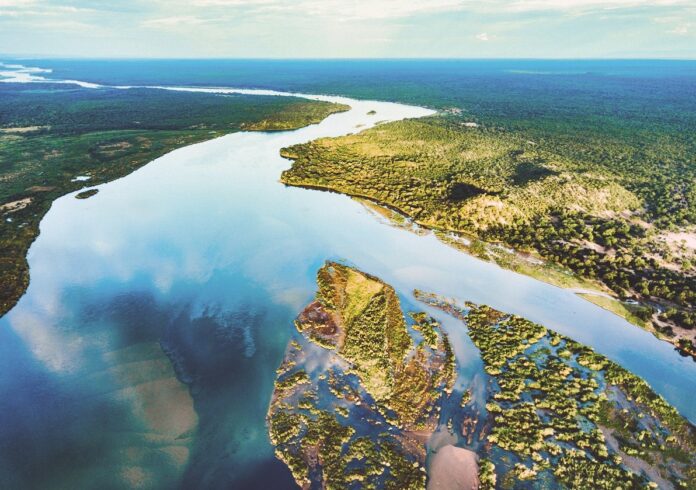By Erika Yarrow-Soden
The United Nations World Water Development Report (WWDR) 2024, Water for Prosperity and Peace, was launched on 22 March, marking World Water Day. This 2024 edition of UN-Water’s flagship annual report on water issues describes how developing and maintaining a secure and equitable water future underpins prosperity and peace for all, and how poverty and inequality, social tensions, and conflict can amplify water insecurity.
Avoiding the politicisation of this controversial subject, the report calls attention to the complex and interlinked relationships between sustainable water management, prosperity, and peace, describing how progress in one area can have positive, often essential, repercussions in the others.
The authors acknowledge that, when water is scarce, polluted, or difficult to access, food security can be undermined, and livelihoods lost, with the potential for subsequent conflict. But far from discussing water conflict as an inevitable global direction of travel, the report offers a positive alternative to this bleak picture of which authorities frequently warn. In addition to recognising the global water challenges, the report offers an alternative – a positive future that embraces collaboration, discourse, new technologies, and ecological solutions that nurture health and wellbeing.
Launched annually, the United Nations WWDR focuses on a different theme each year, and gives policy recommendations to decision-makers by offering best practices and in-depth analyses. This edition gives global leaders, financiers and international corporations serious food for thought. By weighing up the potential benefits of sustainable, equitable water management against the potential humanitarian, environmental and economic risks of inaction, decision-makers are challenged to pose the question: why allow water to create conflict and risk, dividing societies and stakeholders, when it could be used as a power for peace?
Cynics may rush to call such an idea pie-in-the-sky thinking, especially in a world experiencing geopolitical unrest, the challenges of climate change, ecological destruction, population growth, and insecurity with regards to food, water, energy and economics. But the WWDR provides examples of success, explains how technologies can be transformative, and states how sustainable, equitable, forward-thinking water management could benefit people, planet and pocket.
The authors accept that there is no clear way to determine the ‘water footprint’ of prosperity. But the report is clear that water, when managed sustainably and equitably, can be a source of peace and prosperity, being the literal lifeblood of agriculture and the major socio-economic driver for billions of people. It can also prevent the displacement of people and reduce the risk of disasters from extreme weather events. Moreover, the report highlights how water has the capacity to unite people, and encourage sustainable development, climate action and regional integration, with transboundary cooperation helping to build collaborative relationships that support social cohesion, reduce the risks associated with extreme weather, and enable the costs of water management to be shared.
More specifically, the report finds that government-established transboundary river basin organisations have the ability to ‘act as connectors and active peacemakers by facilitating inclusive dialogue and participatory decision-making’. It also highlights how river basin organisations have established effective mechanisms for multi-stakeholder engagement, ‘giving voice to young people, women and concerned stakeholders’.
In addition, it finds that ‘the collaborative management of WASH services and water resources can become a peacebuilding asset’. This is as well as the benefits WASH services have on the lives of the women and girls – who are disproportionately responsible for fetching water – the greater ability it provides for them to attend school, and the benefits for health and hygiene and gender equality, which all contribute to gains for society, the environment, and the economy.
Water and conflict
The hardships of conflict are amplified through water, resulting in impacts that are multifaceted and often indirect, such as those linked to forced migration and increased exposure to health threats. And numerous challenges undermine the provision of WASH services in conflict situations.
“the report calls attention to the complex and interlinked relationships between sustainable water management, prosperity, and peace”
Risks of inaction
The report states that water deficits can currently be linked to 10% of the increase in migration worldwide, with such displacement having the potential to increase the burden on local water systems and resources. The number of migrants and displaced persons increases every year. The Internal Displacement Monitoring Centre 2023 Global Report on Internal Displacement revealed that, at the end of 2022, the number of internally displaced persons reached its highest level ever recorded, with 71.1 million people displaced worldwide, of which 88% was because of conflict and violence.
Clearly, a failure to address the global water crisis would have stark and destabilising consequences when one considers the latest figures from the Intergovernmental Panel on Climate Change, which states that roughly half of the world’s population currently experiences severe water scarcity for at least part of the year. It also observes that, while some areas experience water scarcity a few months per year, others endure severe water scarcity year-round. While cooperation has proven benefits, out of 153 countries sharing transboundary rivers, lakes and aquifers, only 32 have 90% or more of their transboundary waters covered by operational arrangements.
A way forward
The WWDR encourages practical solutions – vulnerability mapping, early warning systems for drying conditions, investment in resilient water infrastructure, governance that includes legal and institutional arrangements to manage water security, and dispute settlement procedures.
The global scenario all too often tells of missed targets, accelerated warming, and opportunities lost as the environmental can is kicked down the road. The WWDR highlights that we are living through a pivotal moment – decision-makers can implement policies that improve water security. Failure to do so risks giving water a role in global instability.








